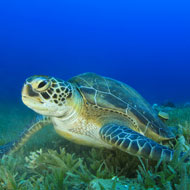Green sea turtle population turning '99 per cent female'

The study found 99 per cent of young green sea turtles hatching on warmer beaches are female.
Scientists are warning that as global temperatures continue to rise, an entire population of green sea turtles could become female, posing a threat to the species.
New research in Current Biology suggests that females now outnumber males by at least 116 to one, in the largest green sea turtle rookery in the northern Great Barrier Reef.
These populations could become all-female in the near future, researchers say, pushing the already endangered green sea turtle closer to extinction.
It is already well known that the sex of sea turtles is determined by the temperature of sand when eggs are incubating. However, no research had previously been done on the impact warming sands are having on the population.
Researchers from the Marine Conservation Society (MCS) found that 99 per cent of young green sea turtles hatching on warmer beaches are female. Those hatching on cooler beaches were around 69 per cent female.
These findings have implications for the other six species of sea turtle, as well as other species where sex is determined by temperature - such as iguanas, alligators and some fish species.
MSC head of ocean recovery, Peter Richardson, says there is evidence to suggest that some turtle populations are adapting to climate change by shifting their breeding season to cooler periods. But for many populations, this is not an option.
“Sea turtles are a very successful group of animals, having survived catastrophic environmental changes in the past,” he explains. “Can they successfully adapt to the alarming pace of human-induced climate change? We don’t know, but only through concerted conservation now will we give them a fighting chance.”



 The RCVS has announced a new version of its 1CPD mobile app, with enhanced features for veterinary surgeons and veterinary nurses to record their continuing professional development.
The RCVS has announced a new version of its 1CPD mobile app, with enhanced features for veterinary surgeons and veterinary nurses to record their continuing professional development.